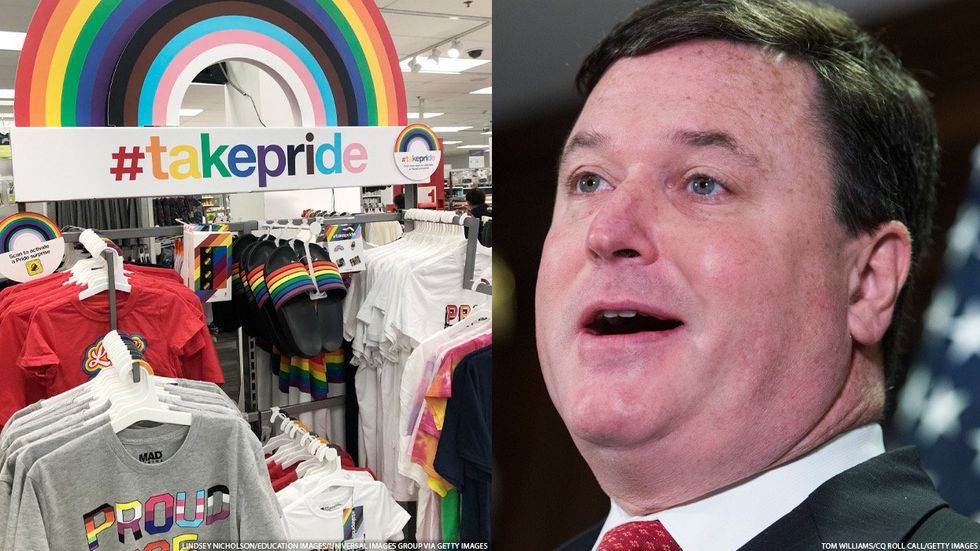Seven Republican attorneys general, including Todd Rokita of Indiana, wrote a letter to Target CEO Brian Cornell expressing concerns over the company’s Pride merchandise.
Attorney generals from Arkansas, Idaho, Kentucky, Mississippi, Missouri, and South Carolina backed Rokita’s letter.
It suggests that the retailer’s LGBTQ+ youth merchandise and content are obscene.
The attorneys general said the company sold “anti-Christian” designs on T-shirts and “Satanic products.”
As part of the letter, the Republicans criticized GLSEN, an organization that advocates for LGBTQ+ students, accusing it of “undermining parents’ constitutional and statutory rights.”
These conservative lawyers also found offensive items with words like “Girls Gays Theys” and images of drag performers in conjunction with other LGBTQ+-themed phrases. They also criticized Target for selling “tuck-friendly” swimwear for kids, but Target only carried that line for adults.
The letter also alleges Target violates its fiduciary duty by making unprofitable decisions that are not in the shareholders’ best interests.
“We are concerned by recent events involving the company’s ‘Pride’ campaign,” the letter begins. “Our concerns entail the company’s promotion and sale of potentially harmful products to minors, related potential interference with parental authority in matters of sex and gender identity, and possible violation of fiduciary duties by the company’s directors and officers.”
Target does not receive specific information in the lengthy letter about what may happen if the merchandise remains in circulation. Various states have recently introduced bills banning LGBTQ+ content under obscenity laws, including drag bans, LGBTQ+ character and subject bans, and school and library restrictions on LGBTQ+ materials.
There was a campaign by far-right groups last month to concentrate on Target’s LGBTQ+ merchandise, led by figures such as Matt Walsh, which resulted in harassment, violence, and threats directed at Target employees.
In late May, Target decided to remove some of its Pride merchandise in certain stores after threats the company received. Target announced then that it was removing “items that have been at the center of the most significant confrontational behavior.” Customers had antagonized Target workers, damaged merchandise displays, and made threats via social media.
Some Republican states tried to ban drag performances in public in the lead-up to Pride Month. Some of those measures were signed into law, but courts have intervened.
Independent journalist and LGBTQ+ rights activist Erin Reed explains, “Lacking legislation that specifically declares content such as Target’s Pride line as obscene, some state attorneys general may turn to interpreting old obscenity laws as including LGBTQ+ content.”
Last month, a coalition of 15 state attorneys general also wrote to Target offering support for the retailer against anti-LGBTQ+ threats and calling on the company to stand by the LGBTQ+ community in the face of that intimidation.
“As Attorneys General with a strong commitment to protecting the civil rights of LGBTQIA+ individuals, we write to express our resolute and unequivocal support for the LGBTQIA+ community as well as our concern regarding recent events in Target stores involving intimidation and destruction of certain Pride-related merchandise and Target’s resulting decision to remove some Pride merchandise from its stores,” began the letter, also addressed to Target CEO Brian Cornell.
“We stand ready to help address anti-LGBTQIA+ threats and harassment in Target stores,” it continues, but goes on to note the many political attacks on the community. “Against this backdrop, Pride merchandise like Target’s helps LGBTQIA+ people see that they enjoy considerable support and that loud and intimidating fringe voices and bullies do not represent the views of society at large.”
The coalition was led by Massachusetts Attorney General Andrea Joy Campbell and Minnesota Attorney General Keith Ellison. AGs from Arizona, California, Connecticut, Delaware, the District of Columbia, Illinois, Maine, Nevada, New Jersey, New York, Rhode Island, Vermont, and Washington State signed on to that letter.



















































































Fans thirsting over Chris Colfer's sexy new muscles for Coachella